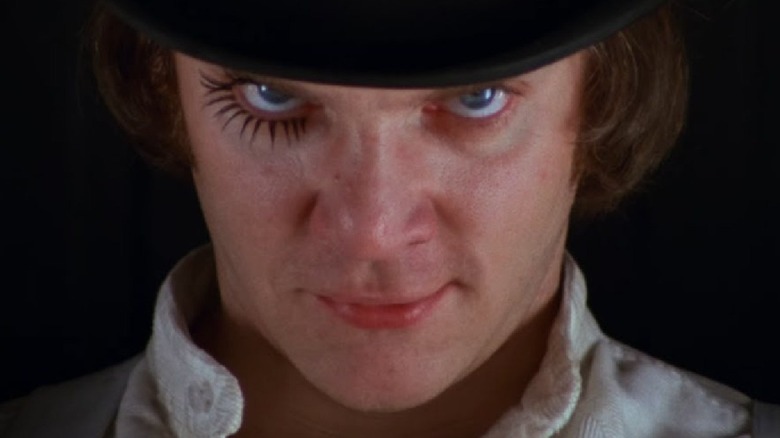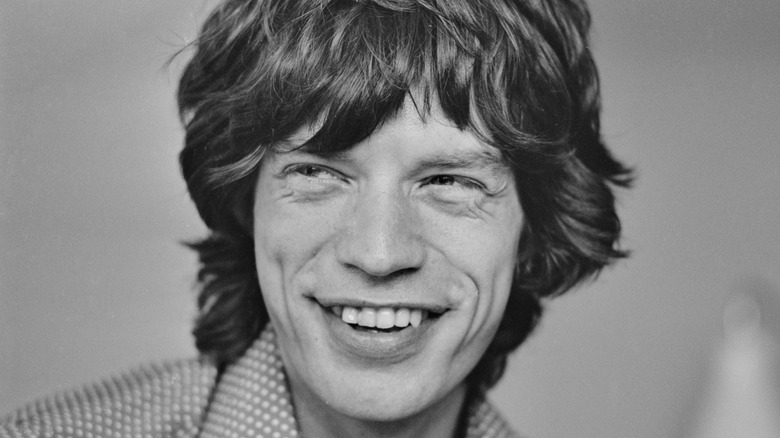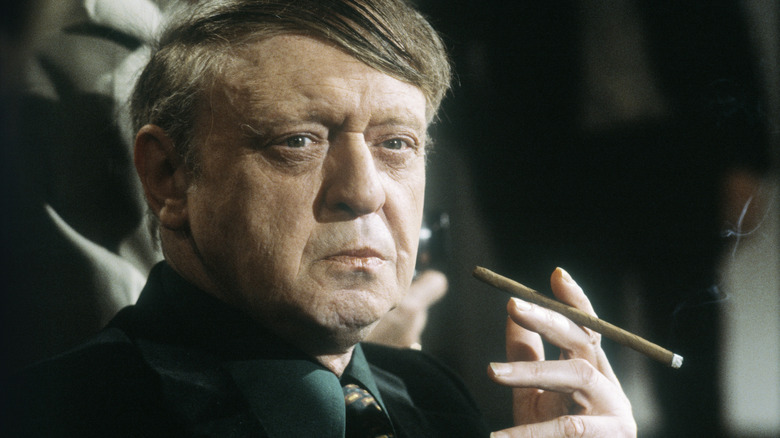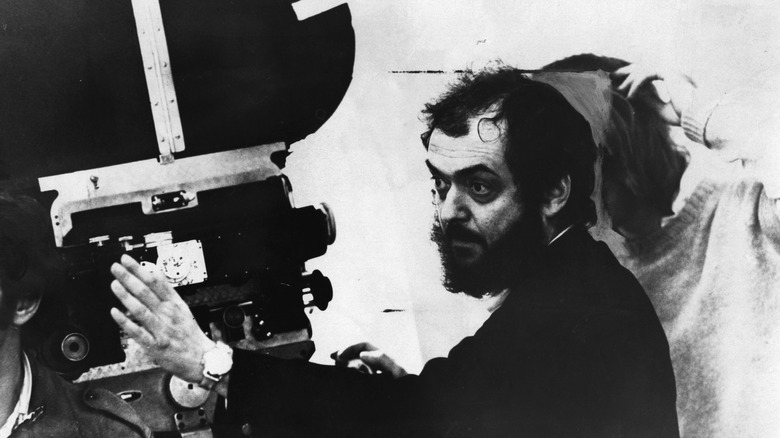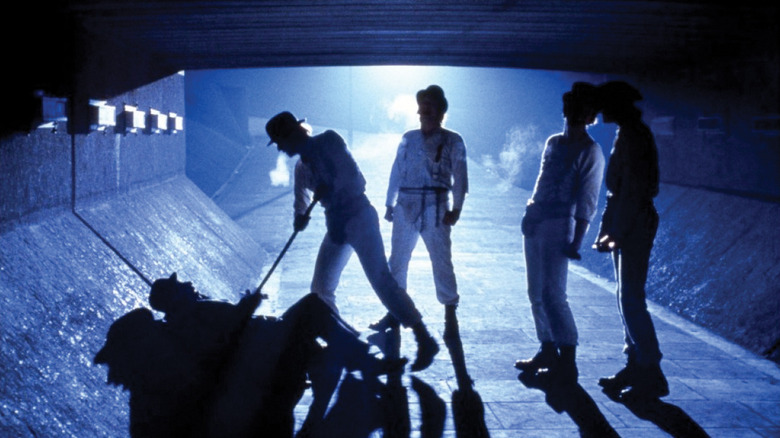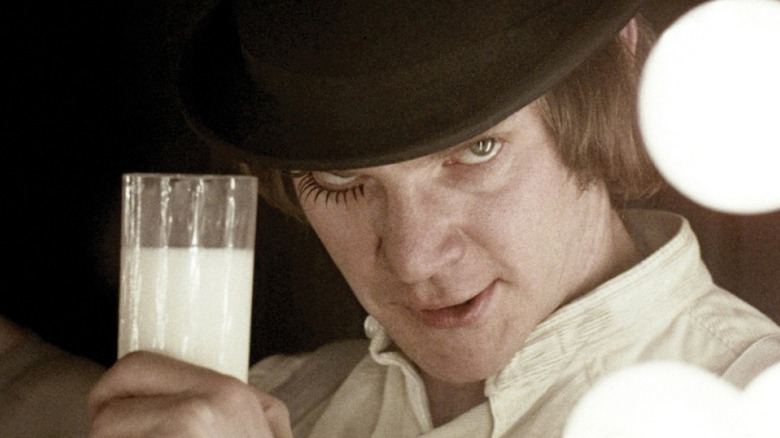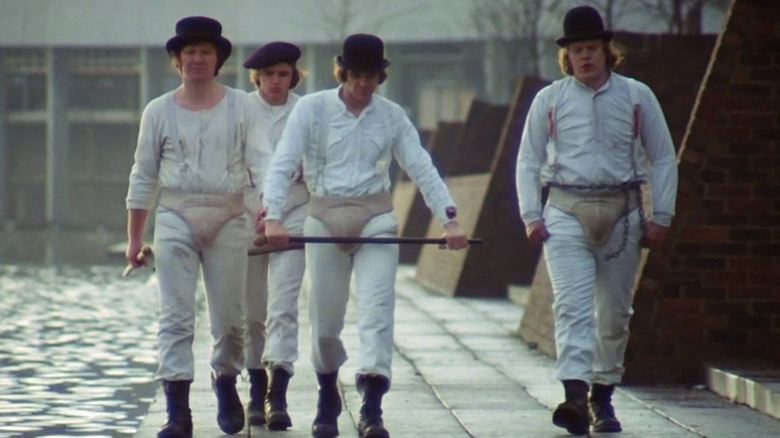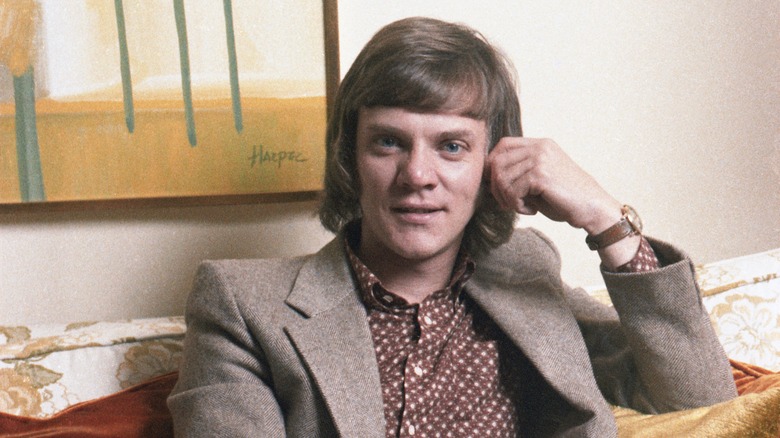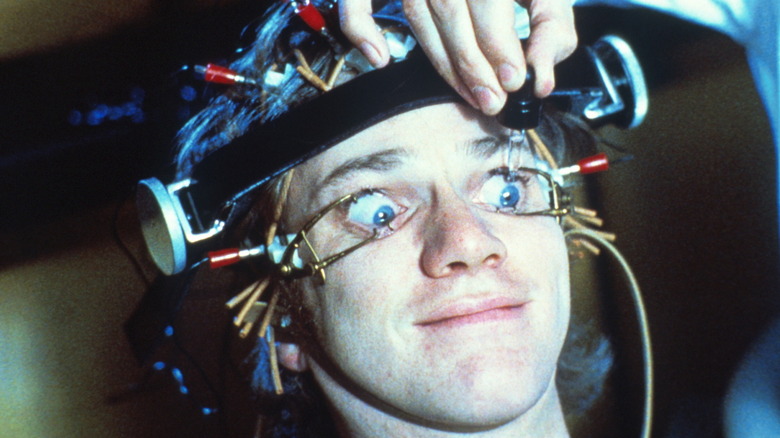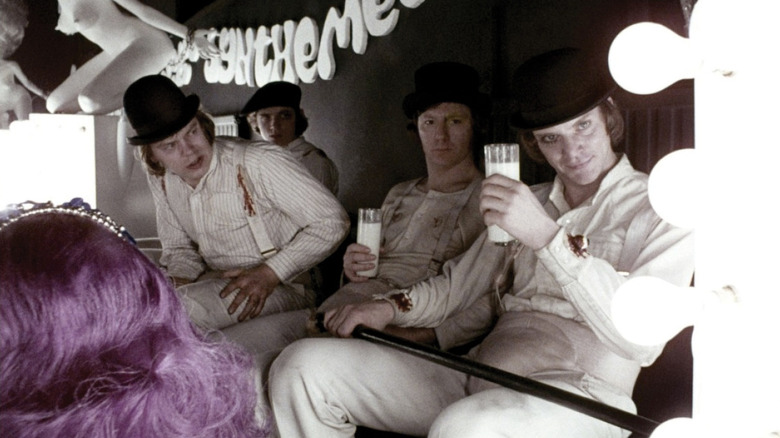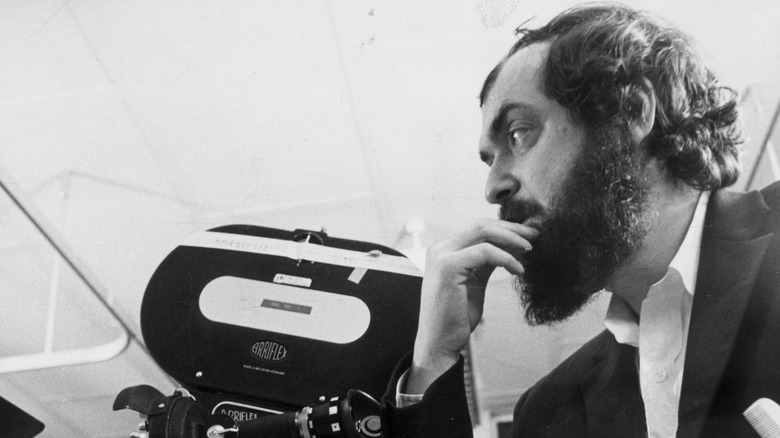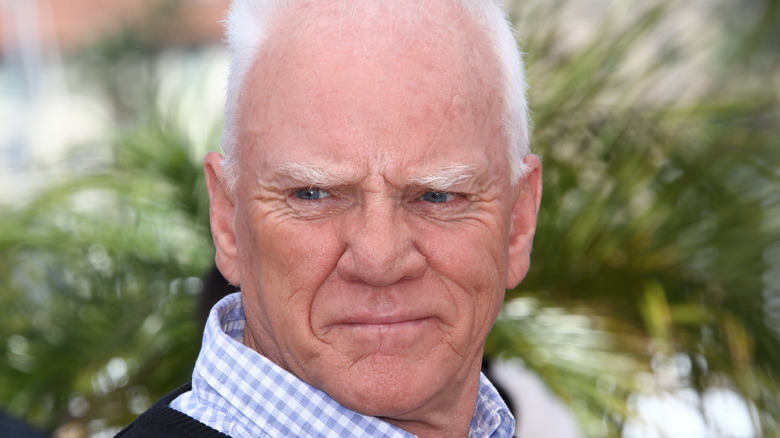The Untold Truth Of A Clockwork Orange
There's never been a film quite like "A Clockwork Orange." It's in a genre of its own and since its release in 1971 controversy has dogged its heels like a persistent pack of Droogs. For its fans, the tale of a young psychopath with a penchant for "ultra-violence" and Beethoven is a morality play on the nature of totalitarianism, state control, and free will. For its critics, it is little more than a highly stylized ode to gratuitous violence and gang culture. Based on Anthony Burgess's 1962 novel, director Stanley Kubrick's film has been banned, lauded, condemned, praised, and endlessly debated. Anyone familiar with this strange and surreal film set in a future that's not quite the future and a world that's not quite our world will know why.
From the opening shot featuring Alex staring intensely at the camera in a half-comical, half-threatening manner and guzzling chemically fortified milk with his sullen, bowler-hat-clad mates, the film unsettles and provokes. From the disconcerting Nadsat street slang to the random beatings, the state-sponsored torture, and the inhumane idealism, "A Clockwork Orange" pokes, prods, and questions the audience. Released in a period when the optimism and promise of the 1960s were running headfirst into the brick wall of 1970s pessimism and cynicism, "A Clockwork Orange" held a mirror up to society and revealed things that people didn't want to acknowledge or debate. Give it another watch and see how it's aged. In the meantime, here are some unusual things that went on behind the scenes.
Mick Jagger could have played Alex DeLarge
Malcolm McDowell captured the mocking, bug-eyed insincerity of Alex DeLarge to perfection. His baby face and softly-spoken mannerisms make Alex's casual violence and sociopathic tendencies just that little bit more disturbing. Yet in an alternate universe, the character could have been played by a preening and posturing Mick Jagger. The Rolling Stones singer had already given star turns in "Ned Kelly" and "Performance," so he might have done a grand job. The Beatles certainly thought so, and according to Rolling Stone, the Fab Four were among other stars who all petitioned for Jagger to play the chief Droog.
Terry Southern, who had co-penned the script for Stanley Kubrick's "Dr. Strangelove," was working on adapting Anthony Burgess's novel for the big screen. At that point, David Hemmings was penciled in to play Alex, but Jagger's friends had other ideas. They sent Southern a letter that read, "We, the undersigned, do hereby protest with extreme vehemence as well as shattered illusions (in you) the preference of David Hemmings above Mick Jagger in the role of Alex." Burgess had sold the original "A Clockwork Orange" rights to Jagger for a paltry $500. Jagger in turn sold them to producer Si Litvinoff for a handsome profit. Yet when he got wind of a new production he and the other Stones wanted in on the action, with the Beatles scoring the soundtrack. Southern's script was eventually banned by the censors, Jagger went on tour, and along came Kubrick.
Anthony Burgess grew to detest A Clockwork Orange
"A Clockwork Orange" is easily prolific author Anthony Burgess's most famous novel, and some would say his masterpiece. The film adaptation would make his star shine even brighter, but the author had conflicted feelings about his work of art. Burgess claimed that he wrote "A Clockwork Orange" while believing he was going to die after being diagnosed (perhaps mistakenly) with a brain tumor (via Beverly Cinema). In an interview, Burgess revealed, "It was the most painful thing I've ever written, that damn book. I was trying to exorcise the memory of what happened to my first wife, who was savagely attacked in London during the Second World War by four American deserters. She was pregnant at the time and lost our child."
Burgess added that the only way he could deal with the attack was to write the book, but that he ended up detesting the novel because of the violence in it. Yet despite rumors to the contrary, Burgess didn't hate Kubrick's film version but thought it was a masterpiece from a genius director. In a contemporary review for The Listener, he hailed it as "technically brilliant, thoughtful, relevant, poetic, mind-opening. It was possible for me to see the work as a radical remaking of my own novel, not as a mere interpretation."
Stanley Kubrick claimed A Clockwork Orange was a study in free will
Over the last 50 years, there's been a lot of literature discussing the exact meaning and nature of "A Clockwork Orange." Is it a dystopian masterpiece? A cutting satire? A black comedy? An exercise in style over substance? A penetrating insight into the nature of humanity, or a shallow film about shallow people? As in all matters worthy of debate, the jury is still out. Yet in an interview with Michel Ciment, Stanley Kubrick explained that free will was the central theme of the film, saying, "Do we lose our humanity if we are deprived of the choice between good and evil? Do we become as the title suggests, a clockwork orange?" The title refers to a person who looks organic but is "only a clockwork toy to be wound up by the God or the Devil." (via The Take).
The attempt to "cure" Alex through the Ludovico Technique is pure authoritarianism. Torturing and brainwashing an individual into submission does not make them good, but makes them less than human. As Alex is told in "A Clockwork Orange" after he's gone through the process, "A man who cannot choose ceases to be a man."
Stanley Kubrick was forced to defend allegations of copycat violence
Malcolm McDowell said in a 2019 interview that compared with modern films, "A Clockwork Orange" now seems like a Disney movie. In 1971 the audience had different aesthetic sensibilities and was a lot less desensitized to onscreen brutality. Luxury London reports that The New Yorker's Pauline Kael branded it "pornographic," while Roger Ebert slammed it as an "ideological mess." A UK politician even warned that the film would lead to an uptick in violence among teens once it was released. The tabloids had a field day printing stories about copycat violence allegedly triggered by the film. The Daily Mail even labeled 16-year-old Richard Palmer, who was on trial for killing a tramp, as "Clockwork Orange boy." It transpired that Palmer hadn't even seen the film, but merely heard about it from his friends.
Metropolitan Police solicitor Mike Purdy recalled that by 1973, the UK courts were full of people pleading that "A Clockwork Orange" had made them go out and commit crimes. He explained, "Most of us who worked at the court thought this a load of rubbish but unfortunately such cases got a load of publicity." Forced to defend allegations of copycat violence, Stanley Kubrick told Michel Ciment, "I know there are well-intentioned people who sincerely believe that films and TV contribute to violence, but almost all of the official studies of this question have concluded that there is no evidence to support the view. At the same time, I think the media tend to exploit the issue."
Stanley Kubrick removed A Clockwork Orange from theaters
Despite vehemently disputing the notion that violence in art could lead to the real thing, Stanley Kubrick eventually decided in 1973 (via Luxury London) to remove "A Clockwork Orange" from circulation in UK theaters. For three decades the film wasn't shown in that country. What caused Kubrick's sudden about-face? The notoriously reclusive director was experiencing numerous protests on his doorstep, but it is reportedly the horrific rape of a Dutch girl vacationing in the UK by a gang of youths as they allegedly sang "Singin' in the Rain" which made him reconsider (via Birth. Movies. Death).
Kubrick met with Warner Bros. Pictures and reached an agreement to pull the film from UK screens. According to The Guardian, Warner Brothers vice-president Julian Senior said, "The police were saying to us, 'We think you should do something about this. It is getting dangerous." Although Kubrick had earlier said in an interview with journalist Michel Ciment, "There has always been violence in art. There is violence in the Bible, violence in Homer, and violence in Shakespeare," it appeared that the director had had enough of the debate over his film. The uncut version of "A Clockwork Orange" wouldn't return to British screens until the spring of 2000.
A Clockwork Orange's influence on popular culture has been huge
When something isn't available anymore, it instantly becomes forbidden fruit, and there's nothing more appealing to youth culture than that which the authorities have declared out of bounds. Although an important and extremely stylized film, it's doubtful whether "A Clockwork Orange" would have cast such a long shadow over popular culture if it hadn't been surrounded by controversy. The film has grabbed and held the attention of generations of artists in music, film, fashion, and literature. New Order's "Ultraviolence," The Libertines' "Horrorshow," and Sepultura's "A-Lex" have all been influenced by the film (via International Anthony Burgess Foundation). Blur, David Bowie, Usher, Madonna, Kylie Minogue, and Guns N' Roses have all at one time or another adopted looks rocked by Alex and the Droogs.
Quentin Tarantino is a fan and told The New Yorker, "That first 20 minutes is pretty f****** perfect. It's about as poppy and visceral and perfect a piece of cinematic moviemaking as I think had ever been done up until that time." Bart Simpson is partial to quoting Alex in a mock Cockney accent and wearing his trademark bowler hat. Business Insider reports that during filming for "The Dark Knight," Heath Ledger kept an infamous detailed diary filled with references to help him get in character for the role of the Joker. Inside its pages, images of Alex DeLarge keep cropping up like a demon from the pit.
Malcolm McDowell improvised the Singin' in the Rain scene
The "Singin' in the Rain" scene is one of the most talked-about moments in "A Clockwork Orange." It reveals the true moral vacuum at the core of Alex and the Droogs. The enthusiastic singing of such a carefree and jaunty tune while committing a home invasion that leads to violence and rape makes for a shocking contrast. Yet there's no mention of the song in Anthony Burgess's novel, nor was it an ingenious idea from Stanley Kubrick to unsettle the audience. The notion to highlight how far Alex had strayed from the human condition came from the man who played him, Malcolm McDowell.
According to The New York Post, McDowell said that everyone found the scene a bit routine and pedestrian until on the fifth day Kubrick asked him, "Can you dance?" McDowell explained that he began singing "the most euphoric song in film history," and "it took things to a surreal place." But McDowell added that he was disappointed when audiences missed the black comedy aspect of the sequence.
McDowell also recalled that he was introduced to Gene Kelly on his first visit to Hollywood a few years later, but the actor who made the song world-famous turned his back on him. McDowell initially thought that Kelly was unhappy with the way his song was used. But 40 years later, according to The Hollywood Reporter, Kelly's widow told McDowell that Kelly was angry because Kubrick never paid for the song.
Malcolm McDowell suffered for his art during the brainwashing scenes
When he is not busy inflicting pain, Alex DeLarge is busy receiving it. During the iconic aversion therapy sequence when his eyes are pried open by surgical clamps and he is exposed to a relentless stream of violent images, McDowell suffered alongside his character. He explained in The Guardian that in the build-up to the scene, "Stanley showed me a picture of an eye-operation patient with lid-locks and asked me I could have that done to me." The actor refused and a compromise was reached to anesthetize McDowell's eyes. However, when they shot the scene the lid-locks continually fell out of position and scratched his cornea.
McDowell explained, "I was in such pain I was banging my head against a wall. But Stanley was mainly concerned about when he would be able to get his next shot." McDowell also told NME, "He was a control freak, without a doubt, on everything. One of the electricians said: 'He's tryin' to kill you Malc, he's tryin' to kill you.'" By the end of the film, McDowell admits he was a physical and emotional wreck but has no regrets: "You make a movie like that, it's historic and you put it in the vault ... Am I glad I did it? Absolutely. It's remarkable."
Cricket helped inspire Alex's distinctive look
There's something curiously quaint about cricket: the hypnotic sound of leather on willow, long and languid days spent batting and bowling on the village green, followed by a civilized round of gin and tonics to celebrate another match of gentlemanly conduct. That's why having a young urban thug like Alex DeLarge dressed in a uniform that takes its cues from cricket whites must have appealed to Stanley Kubrick's black sense of humor. The Washington Times reports that McDowell and Kubrick had been discussing what image to give Alex when McDowell said they could try the cricket gear he had lying about in his car.
Seeing McDowell decked head to toe in white sealed the deal for Kubrick. He was pleased with its purity and crispness and also thought it would be a good idea for McDowell to turn the groin protector into a huge codpiece and wear it on the outside. The image of one of cinema's most iconic psychopaths was given an extra element when McDowell was shown a giant box of hats and told to pick one. During an interview at Cannes, McDowell said, "I chose the bowler, because it symbolized the city and respectability, and I just wanted to give a real (screw) you to the establishment." The final flourish came in the shape of the unsettling fake eyelash that McDowell wore over one eye.
Kubrick leaves out the book's original, more positive ending
In "A Clockwork Orange," condition-reflex therapy reduces Alex to little more than a mechanical puppet who can find joy in neither violence nor beauty. He attempts suicide by throwing himself out of a window, yet he survives. Before the final credits roll, he has returned to his core self with one major difference — he can now indulge his violent tendencies with a certain degree of approval by the state. In essence, he is no longer a wild wolf but a vicious dog on the leash. He does not renounce violence or the amoral life but just changes tactics, announcing, "I was cured after all."
But in the last chapter of Anthony Burgess's book, Alex turns his back on all violence and his redemption is complete. The first American edition of "A Clockwork Orange" cut this chapter in favor of a more ambiguous ending. In an interview, Stanley Kubrick stated that he had not read the UK version of "A Clockwork Orange" until he had finished the screenplay. He explained, "This extra chapter depicts the rehabilitation of Alex. But it is, as far as I am concerned, unconvincing and inconsistent with the style and intent of the book."
Malcolm McDowell initially hated A Clockwork Orange
"A Clockwork Orange" was a huge vehicle for Malcolm McDowell. Yet for years Stanley Kubrick's classic left McDowell with a bad taste in his mouth. He told the NME, "For the first 10 years after I made it I resented it. I was sick of it. I didn't want to talk about the f****** thing. Then I came to the realization that it was a masterwork. You may as well just accept it and enjoy it."
McDowell also revealed that when he asked Kubrick why he picked him for the role, the director told him that he brought an aura of intelligence to the role. "Alex is a thug, but he's not just a thug," explained McDowell. "Anyone who loves classical music can't be all that bad, let's face it. So that was what he was looking for." McDowell also revealed that the year and a half he spent with the Royal Shakespeare Company, saying lines in the cadences and language of the Bard, was helpful in mastering the futuristic slang — Nadsat — that Alex and his Droogs speak.
Reflecting on society's ongoing, paranoid terror of the elements within its fabric that it cannot control or understand, McDowell described "A Clockwork Orange" as "a warning ... the warning signs are all there." Viddy well, little brother, viddy well!
